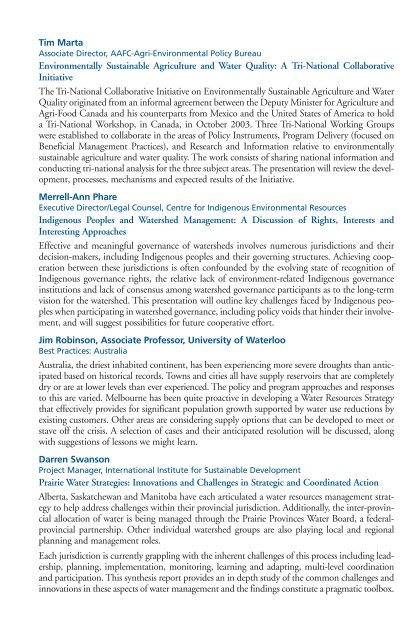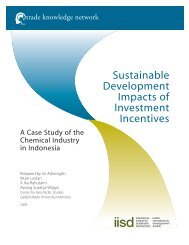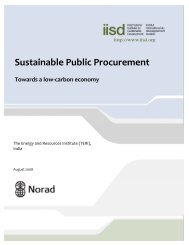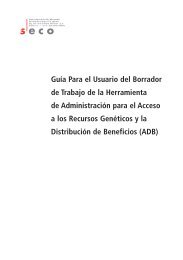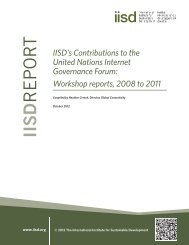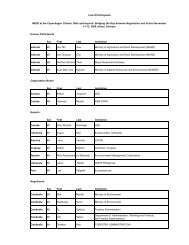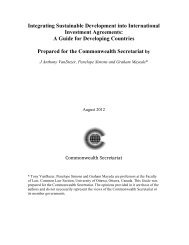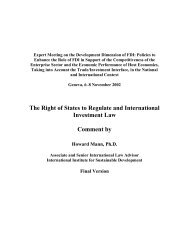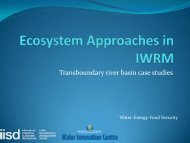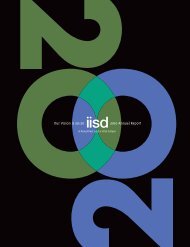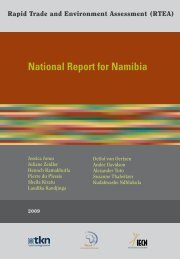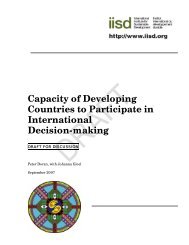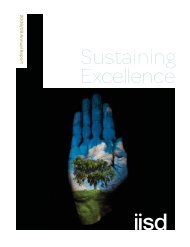Full program - International Institute for Sustainable Development
Full program - International Institute for Sustainable Development
Full program - International Institute for Sustainable Development
Create successful ePaper yourself
Turn your PDF publications into a flip-book with our unique Google optimized e-Paper software.
Tim Marta<br />
Associate Director, AAFC-Agri-Environmental Policy Bureau<br />
Environmentally <strong>Sustainable</strong> Agriculture and Water Quality: A Tri-National Collaborative<br />
Initiative<br />
The Tri-National Collaborative Initiative on Environmentally <strong>Sustainable</strong> Agriculture and Water<br />
Quality originated from an in<strong>for</strong>mal agreement between the Deputy Minister <strong>for</strong> Agriculture and<br />
Agri-Food Canada and his counterparts from Mexico and the United States of America to hold<br />
a Tri-National Workshop, in Canada, in October 2003. Three Tri-National Working Groups<br />
were established to collaborate in the areas of Policy Instruments, Program Delivery (focused on<br />
Beneficial Management Practices), and Research and In<strong>for</strong>mation relative to environmentally<br />
sustainable agriculture and water quality. The work consists of sharing national in<strong>for</strong>mation and<br />
conducting tri-national analysis <strong>for</strong> the three subject areas. The presentation will review the development,<br />
processes, mechanisms and expected results of the Initiative.<br />
Merrell-Ann Phare<br />
Executive Director/Legal Counsel, Centre <strong>for</strong> Indigenous Environmental Resources<br />
Indigenous Peoples and Watershed Management: A Discussion of Rights, Interests and<br />
Interesting Approaches<br />
Effective and meaningful governance of watersheds involves numerous jurisdictions and their<br />
decision-makers, including Indigenous peoples and their governing structures. Achieving cooperation<br />
between these jurisdictions is often confounded by the evolving state of recognition of<br />
Indigenous governance rights, the relative lack of environment-related Indigenous governance<br />
institutions and lack of consensus among watershed governance participants as to the long-term<br />
vision <strong>for</strong> the watershed. This presentation will outline key challenges faced by Indigenous peoples<br />
when participating in watershed governance, including policy voids that hinder their involvement,<br />
and will suggest possibilities <strong>for</strong> future cooperative ef<strong>for</strong>t.<br />
Jim Robinson, Associate Professor, University of Waterloo<br />
Best Practices: Australia<br />
Australia, the driest inhabited continent, has been experiencing more severe droughts than anticipated<br />
based on historical records. Towns and cities all have supply reservoirs that are completely<br />
dry or are at lower levels than ever experienced. The policy and <strong>program</strong> approaches and responses<br />
to this are varied. Melbourne has been quite proactive in developing a Water Resources Strategy<br />
that effectively provides <strong>for</strong> significant population growth supported by water use reductions by<br />
existing customers. Other areas are considering supply options that can be developed to meet or<br />
stave off the crisis. A selection of cases and their anticipated resolution will be discussed, along<br />
with suggestions of lessons we might learn.<br />
Darren Swanson<br />
Project Manager, <strong>International</strong> <strong>Institute</strong> <strong>for</strong> <strong>Sustainable</strong> <strong>Development</strong><br />
Prairie Water Strategies: Innovations and Challenges in Strategic and Coordinated Action<br />
Alberta, Saskatchewan and Manitoba have each articulated a water resources management strategy<br />
to help address challenges within their provincial jurisdiction. Additionally, the inter-provincial<br />
allocation of water is being managed through the Prairie Provinces Water Board, a federalprovincial<br />
partnership. Other individual watershed groups are also playing local and regional<br />
planning and management roles.<br />
Each jurisdiction is currently grappling with the inherent challenges of this process including leadership,<br />
planning, implementation, monitoring, learning and adapting, multi-level coordination<br />
and participation. This synthesis report provides an in depth study of the common challenges and<br />
innovations in these aspects of water management and the findings constitute a pragmatic toolbox.


